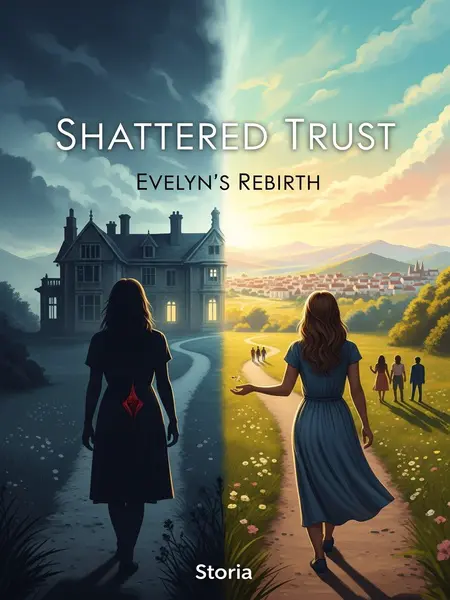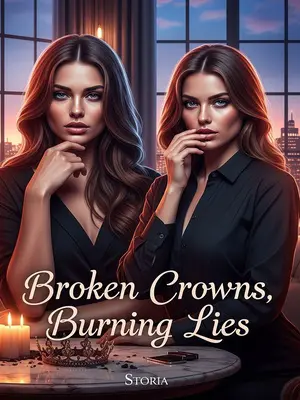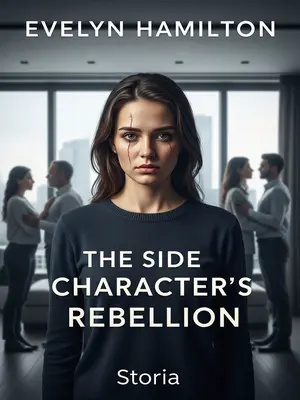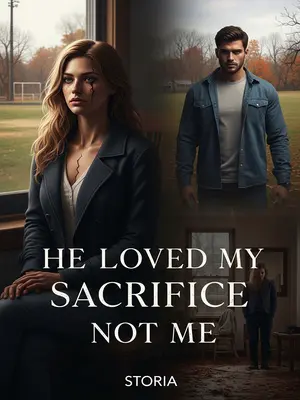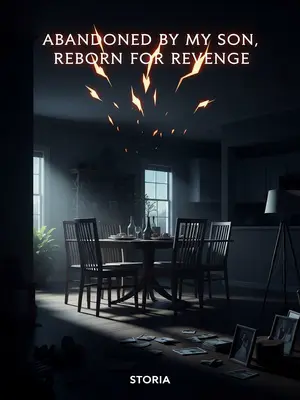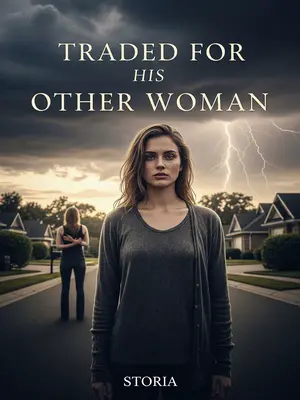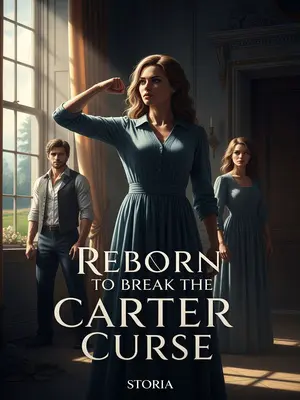Chapter 3: The Luncheon Debacle
Savannah asked with some pride, "Evelyn, do you approve of today’s luncheon?"
Her voice dripped with false humility, but her eyes sparkled with challenge. I smiled politely, refusing to give her the satisfaction of a real reaction.
I replied, "Second sister’s taste is naturally excellent."
I made sure to say it just loud enough for the nearest ladies to hear, letting my tone hover between sincerity and sarcasm. A few snickered behind their napkins. Savannah’s lips twitched, uncertain whether to thank me or glare.
She beamed. Her cousin covered her mouth with her napkin, looking me up and down, giggling: "Savannah not only has good taste, she’s capable too, greeting guests at the door early. Unlike you, showing up late and dressed like that as the hostess."
The cousin’s words hung in the air, sharp as a slap. I felt every eye in the room turn to me, measuring my dress, my shoes, my worth. I lowered my gaze, playing the part of the embarrassed outsider.
Ah, is this the legendary useless teammate? I bowed my head in shame, tugging at my slightly worn jacket, embarrassed: "I haven’t made new clothes lately; sorry to make everyone laugh."
I let my voice tremble just a little, giving the ladies exactly what they wanted—a glimpse of weakness. I saw a few of them exchange glances, their smiles turning sly. I knew the game they were playing.
The ladies present were all sharp-tongued; hearing this, they whispered behind their napkins, and Savannah’s face turned white. Her goal today was to show off that she, now in charge, was better than me, the former head. But all the staff have new uniforms, while I, the hostess, wear old ones—such obvious embezzlement. The ladies won’t call me weak, but if this spreads among the socialites, that’s skill. They’ll say the second branch of the Whitaker family has no class, bullying the orphan and widow of the main branch, and foolishly letting it be known, just handing others a handle to laugh at. Savannah glared at her cousin, about to explain, when the music suddenly stopped and everyone’s attention turned to Melody. Councilwoman’s daughter, Charlotte, took the chance to stand beside me: "Evie, didn’t you say you got a new recipe last time? Take me to see it."
Charlotte’s timing was perfect, swooping in like a guardian angel. She looped her arm through mine, steering me away from the crowd. I shot her a grateful smile, and she winked back, her eyes full of mischief.
The other ladies also pretended to discuss the next song, leaving Savannah alone in the center, unable to speak or not speak, her face red as blood. I stifled my laughter, leading Charlotte to my room. Melody, sitting behind the crowd, nodded at me from afar. I smiled in response, but before I had walked a few steps, a cry came from behind. "Miss! Miss, what’s wrong!"
The sudden commotion snapped everyone to attention. I turned, heart racing, as the staff rushed to the judge’s daughter, Miss Wallace, who had collapsed in her chair. The room erupted into chaos, the music forgotten, the pastries untouched.
The judge’s daughter, Miss Wallace, had fainted in full view, breaking out in a terrible rash. The doctor said it was an allergic reaction. Those two words terrified everyone, who rushed to be examined; the judge’s staff turned pale. How could there be an allergy at a flower luncheon? Everyone looked at Savannah, who seemed stabbed by dozens of needles, tottering. Clearly, she had no idea why. Seeing Miss Wallace’s rash, I had a thought and asked the doctor, "Doctor, what kind of reaction is this? Is it possible she ate something she shouldn’t?"
I kept my tone gentle, almost apologetic, but I knew exactly what I was doing. The staff hovered nearby, waiting for someone to take charge. I glanced at the table, noting the half-eaten pastries and the untouched plates. Savannah looked lost, her hands trembling as she clutched her napkin.
I wasn’t speaking without reason—Miss Wallace had dietary restrictions, noted in the booklet her family sent, especially no peanuts. So whenever I hosted her, I never served peanut dishes, and if there was a trace, I’d have Quinn inform her aide. That’s basic for a head hostess, nothing special. But my question gave Savannah a target; already nervous, she now accused me of sowing confusion. She scolded me loftily: "Evelyn, you’re not a doctor, why are you interrupting!"
Savannah’s voice was sharp, brittle with fear. I could see the panic in her eyes, the way she looked to the other ladies for support. No one came to her rescue.
I covered half my face with my napkin, playing the frightened victim. Charlotte wanted to laugh at my act and played along: "Savannah, you’re not a doctor either, why are you interrupting? Why don’t you tell everyone what it is? Or just bring out the antidote! Save the doctor some trouble."
Charlotte’s words drew a few nervous laughs, the tension in the room easing just a bit. I peeked over my napkin, letting my eyes fill with worry. The staff hovered, unsure whether to move or stay put.
"Why would I do that? I barely even know her!" Savannah shot back, defensive and desperate. The accusation hung in the air, heavier than the scent of roses. I saw a few of the ladies exchange worried glances, their confidence in Savannah beginning to waver.
At this moment, Miss Wallace’s aide suddenly knelt before me and the doctor, interrupting Savannah and Charlotte’s argument. "Yes! Yes! My lady can’t eat peanuts. If she does, she breaks out in a rash and sometimes faints!"
The aide’s voice shook, her eyes pleading. The doctor nodded, already scribbling a prescription. The room seemed to hold its breath, waiting for the verdict.
The doctor considered: "That’s possible." He turned to me: "Miss, I need to prescribe medicine..."
I nodded before he finished, having Quinn follow him to fetch the medicine. Charlotte gave Savannah a triumphant look: "If you can’t do things well, forget it. Evie cleans up your mess, and you act like a victim. Do you think you’re so precious that everyone must respect you? Anyone can see which Whitaker girl is more reliable."
Charlotte’s words cut through the room like a knife. I saw a few of the ladies nod in agreement, their loyalty shifting with the wind. Savannah’s face crumpled, her composure slipping away.
She meant the doctor asked me, not Savannah. I looked at Charlotte with admiration—her tongue was sharp as a knife. No wonder I treated her well. Savannah was speechless, glaring at me with red eyes as if she wanted to eat me alive. I pretended to tremble and hid behind Charlotte: "Charlotte, stop. Second sister worked hard for this luncheon; she didn’t mean it. Besides... she’s in charge now..."
I let my voice trail off, leaving the rest unsaid. The implication was clear. The ladies murmured among themselves, their eyes on Savannah. I pressed a hand to my chest, feigning distress, while Charlotte squeezed my shoulder in silent support.
Ah, say half and leave the rest to imagination. Take the white-lily path, leaving no path for the white lily. I must say, playing the victim really works. People always side with the weak to feel kind and strong. Now, everyone looked at Savannah like she was the villain. "Evelyn, can you stop pretending!" Savannah was about to explode.
I lowered my eyes and forced out a few tears. Savannah wanted to scold me more but knew the more she said, the worse it would get, so she could only hold back her anger. Ah, how delightful. Savannah didn’t stay angry long; after chaos, Miss Wallace finally woke up, and everyone breathed a sigh of relief. At least no one was really poisoned. Especially Savannah, who though unwilling to admit I was right, was glad Miss Wallace was safe. Otherwise, even if cleared of negligence, she’d still be blamed for carelessness. But the judge’s wife, who came to fetch Miss Wallace, wasn’t about to let her go. In front of all the ladies, she harshly scolded Savannah. "I’ve run more dinner parties than you’ve had hot meals, and I’ve never seen such a mistake... What guests can and can’t eat is all written in the booklet given to the hostess..."
The judge’s wife was formidable, her words ringing through the hall like a gavel. Savannah shrank under her gaze, her hands twisting the hem of her dress. The other ladies watched in silence, their judgment clear.
Savannah, still angry, blurted out without thinking: "Ma’am, didn’t Miss Wallace know she couldn’t eat peanuts? Didn’t her aide know? I didn’t force her to eat the peanut pastry."
Her outburst drew a gasp from the crowd. The judge’s wife narrowed her eyes, her voice icy. "You!"
Worthy of being Maple Heights’ top talent—if nothing else, her debate skills are real. Miss Wallace, half-reclining on a couch, was so angry her chest heaved. She weakly protested: "I didn’t eat peanut pastry."
Her voice was barely audible, but everyone heard. The room was silent, the tension thick enough to cut with a knife.
At the crucial moment, I had to finish her off. I pointed at the pastries on the table: "Did you eat this?"
I held up the offending pastry, making sure everyone saw. Miss Wallace nodded, her face pale.
"This is a new dessert from Oak & Vine. It doesn’t have peanut pieces inside, but the outside is coated with peanut powder," I explained.
My tone was gentle, almost apologetic. The ladies leaned in, eager for the details. Savannah stared at the pastry as if it might bite her.
Savannah was dumbfounded: "How was I supposed to know..."
Her voice trailed off, the fight gone from her eyes. The judge’s wife shook her head, her disappointment palpable.
She couldn’t go on. The judge’s wife was furious: "Didn’t know? You dare serve food without knowing what’s in it? Don’t you know a small mistake in food can kill someone?"
The judge’s wife turned to the crowd, her voice rising. "Ignorant, disrespectful, ungrateful—no wonder your family has only a trustee, not a real head!"
This was a vicious condemnation, especially coming from the judge’s wife. Savannah finally couldn’t take it and fainted.
The staff rushed to her side, but the damage was done. The room buzzed with whispers, the story already growing in the telling. I slipped away, grateful for the chaos.
The judge’s wife’s words spread quickly, until even the folks at the local diner in Maple Heights said the Whitaker family had no real head because Savannah was unworthy. Of course, that’s not the truth, but no one but Savannah cares about the truth. The judge didn’t let the household off, reporting Uncle Mark to the city council, never mentioning the luncheon but blaming him for poor management. The mayor, outwardly cheerful, ended up rewarding the judge’s family with a basket of fruit and docking Uncle Mark’s pay for half a year. I know all this because after punishing them, the mayor told his wife to send me new fabric—saying the Whitaker’s eldest girl was pitiful without elders. Under Savannah’s hateful gaze and Trevor’s confusion, I respectfully accepted the reward. But behind closed doors, I couldn’t laugh. The mayor’s reward made my days harder. Yes, I was orphaned, Mrs. Whitaker and Mr. Whitaker both gone, but as long as I was the Whitaker’s eldest girl, Uncle Mark was my elder. The mayor’s words and reward were to make the main and second branches completely break, telling us: I’m watching your petty affairs. Stroking the smooth fabric, I thought back—did Mrs. Whitaker make a mistake back then? The Whitaker family was the last hereditary trust in this region; the others were dissolved by the previous mayor. The Whitaker patriarch had saved the mayor and died young, so the trust was kept. But Trevor’s father also died young, holding the trust less than five years. At that time, there was no trustee, and Trevor was only two, so everyone thought the trust would go to Uncle Mark. But Mrs. Whitaker refused, using all her connections to get a council promise: if Trevor grew up healthy, the trust was his; if he died, the Whitaker family was just the Whitaker family. The mayor, wanting to dissolve the trust, agreed. Uncle Mark, realizing this, poisoned Mrs. Whitaker. For the trust and Trevor, Mrs. Whitaker spent all her resources, adopted me from a distant branch, and taught me to manage the household, preserve her assets, survive in the Whitaker household, and protect Trevor. But she couldn’t foresee the mayor, when Trevor was thirteen, only made him trustee, not full head. As for making him head? The mayor didn’t mention it, so the household could have only a trustee. Oh, and that’s only if the trustee survived.
